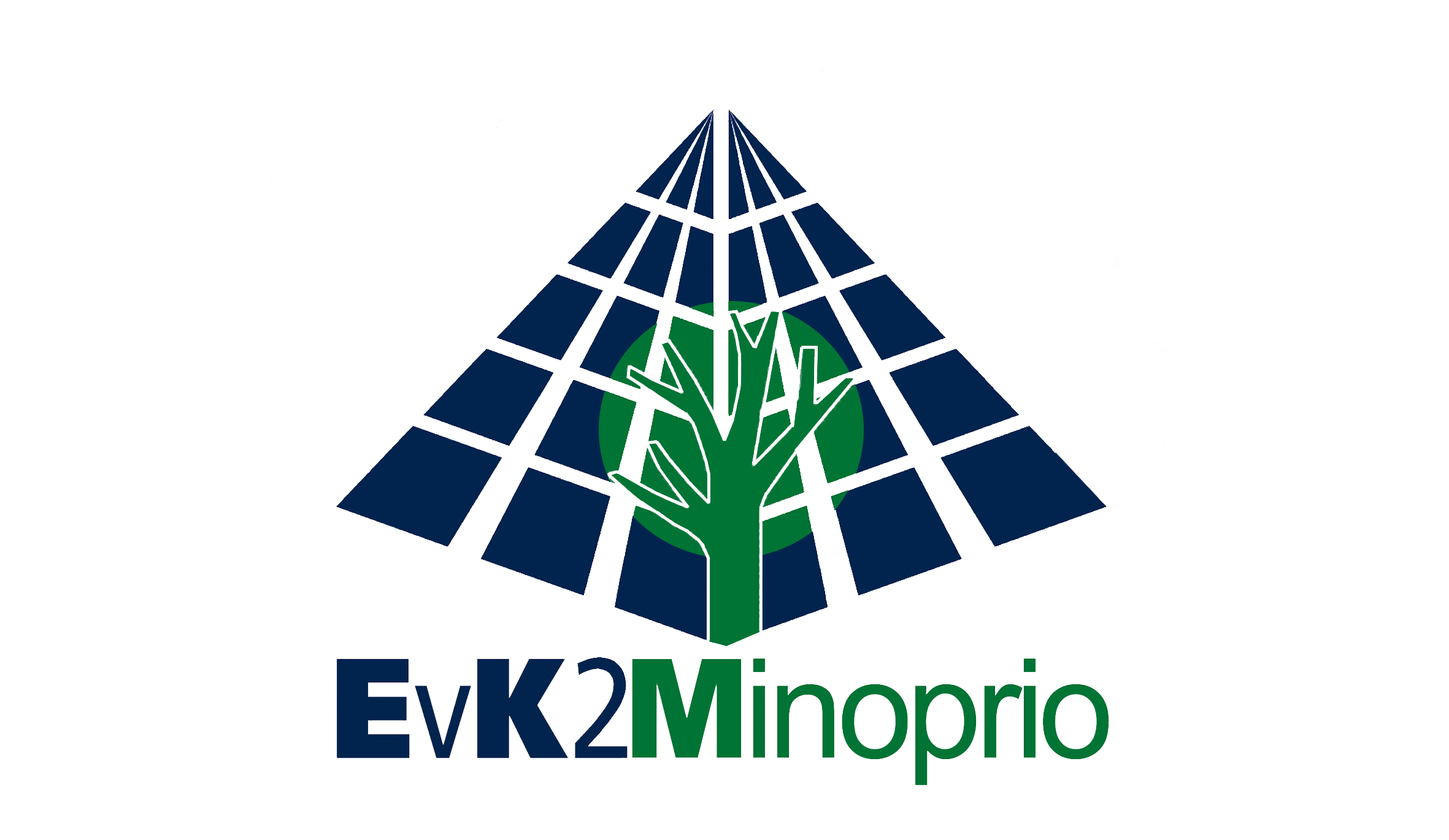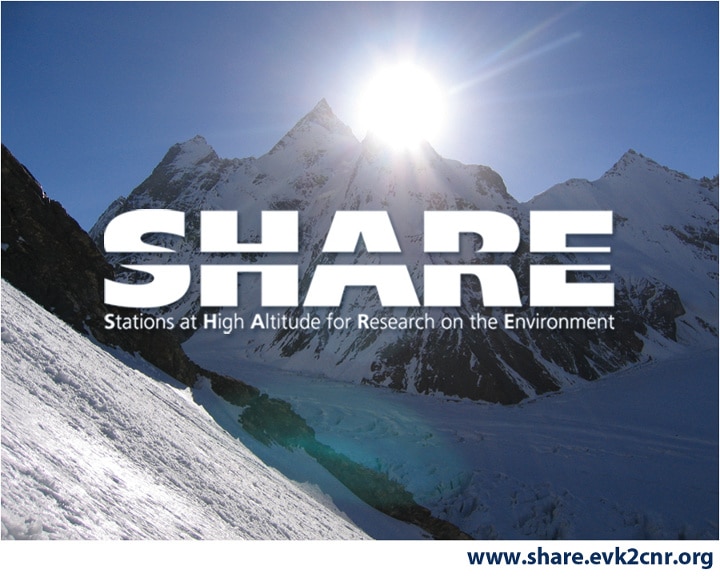Project SHARE
Mountains represent an important source of water, energy and biological diversity. Moreover, as affirmed by the Rio Declaration on Environment and Development (United Nations Conference on Environment and Development, 14 June 1992), mountains provide key resources as minerals, forest and agricultural products as well as recreation. However, mountain areas that cover about a fourth of the Earth’s land surface giving hospitality at about 13% of world population, are fragile ecosystems, very sensitive to global climate changes: as the world heats up, mountain glaciers are melting with rare plants and animals struggling to survive in an ever diminishing favourable habitat. Moreover, due to their relatively remoteness from highly populated and industrialized regions, mountains are considered ideal locations for investigating the impact of climate changes from regional to global scales, as also recently defined in the UN resolution (UN, A/Res/62/196, 2008). The promotion of environmental observations in these areas allows the acquisition of unique information about the background conditions of the environment, also facilitating the study of the role played by natural or anthropic processes in perturbing this pristine habitat.
For these reason and following the UN resolutions and indications Ev-K2-CNR launched the SHARE project – Stations at High Altitude for Research on the Environment – with the aim to promote continuous scientific observations in key high-mountain regions able to contribute to knowledge on regional and global climate change. Through these activities, national and international governments are supported in order to promote sustainable development and adaptation policies against climate change effects in the mountain regions. In particular, thanks to a direct cooperation with UNEP (United Nations Environmental Program), extreme attention is devoted in addressing priority issues and present themes..
Specific aims of SHARE are to improve scientific knowledge on climate variability in mountain regions, by ensuring the availability of long term, high quality data. To this aim, a global mountain observation network on atmospheric composition, meteorology and glaciology, hydrology and water resources, biodiversity and human health has been implemented and maintained. SHARE activities also plan to include the design of mitigation and adaptation strategies to oppose the effects of climate change.
This following the resolution adopted by the UN General Assembly during the 78th plenary meeting concerning the Sustainable mountain development (UN, A/Res/62/196, 2008): “Mountains provide indications of global climate change through phenomena such as modifications of biological diversity, the retreat of mountain glaciers and changes in seasonal runoff that may impact major sources of freshwater in the world, and stresses the need to undertake actions to minimize the negative effects of these phenomena. Sustainable mountain development is a key component in achieving the Millennium Development Goals in many regions of the world.”
Technological developments and capacity building are also considered crucial by SHARE. In particular, local institutions are directly involved in the monitoring and research activities assuring a continuous support to environmental management policies and decision-making processes in developing countries (UNEP – Bali Strategic Plan), also taking into account relations with the social system, and a close collaboration with stakeholders is always sought.
SHARE activities are developed according to four distinct tasks:
i) Scientific research
Multi-disciplinary and interdisciplinary scientific research is based on observations and sampling activities conducted at high mountain stations. To study climate change in mountain environments and to better understand ongoing processes and phenomena, an integrated approach based on long-term observations and on appropriate climate modelling activities is followed. On the basis of such information, feasible mitigation strategies can be developed.
Thanks to the excellence and uniqueness of the data collected at high mountain stations, SHARE directly promotes environmental research and scientific studies and provides contributions to integrated monitoring programs such as UNEP-ABC, WMO-GAW, WCRP-CEOP, NASA-AERONET, ILTER.
ii) System Technology
The objective difficulty of performing continuous measurements at high altitudes, is one of the reasons why knowledge of climate and environmental processes in mountain areas is still limited. Advancement in the technologies for climate change monitoring in high-altitude regions is thus needed in order to obtain high quality measurements. To advance observational and measurement activities at high-altitude locations, SHARE is developing a sophisticated technological system. This innovative, high-tech, integrated environmental and geophysical monitoring system modular and adaptable, permits to carried out measurements even where the installation of a permanent laboratory is too difficult to install and maintain or too expensive. The system will be equipped with near-real-time data transmission and will use renewable energy sources, ensuring high performance and low environmental impact.
iii) Information System
The SHARE Information System is an integrated GIS database for environmental data management in high mountain regions. In this framework, SHARE is developing a platform for web services based on GeoNetwork open source architecture, to create an international standard catalogue of data and metadata to be used by the scientific community. Two principal actions are considered: (i) a shared database for the collection, management and access to spatial and non spatial data; (ii) a dedicated thematic portal for the access to distributed databases and to remote high altitude stations. The web portal will allow users and stakeholders to identify and access information from a wide range of sources, from the local to the global level. The system will be made accessible to concerned stakeholders, such as governments, networks, consultants, scientific research institutions, policy-makers and all those interested in sustainable development and environmental problems. Electronic information systems and databases on environmental monitoring in mountain areas facilitate the dissemination of knowledge, helping to improve the understanding of climate change processes and the development of proper mitigation and adaptation strategies.
iv) Capacity Building
The SHARE project supports the sustainable development of mountain regions and aims at improving local environmental management systems by transferring technology and know-how in the fields of environmental and geophysical sciences. The negative effects of climate change and of the unsustainable use of mountain resources should be taken into account at both policy and administrative levels. The capacity to integrate such information in national and international development processes should however be strengthened. Institutions and societies need to become even more engaged in addressing the threats of global change, moving beyond emission reduction policy to the adoption of structures and lifestyles adapted to the ongoing social and environmental changes. UNEP close collaboration with SHARE will strengthen partnership with developing countries, supporting scientific knowledge and technological expertise for environmental and climate studies. The know-how will be shared locally and with inter- governmental agencies, providing a technology transfer mechanism and supporting decision-making on the environment.



